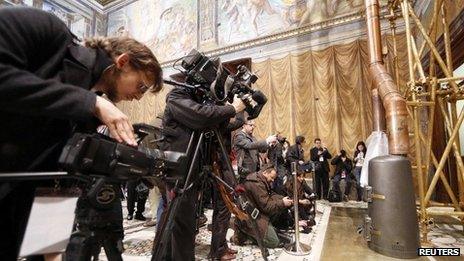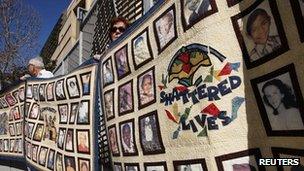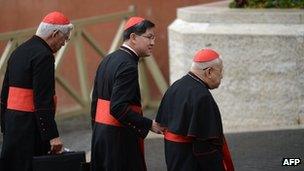The Vatican: Suspense and intrigue
- Published
- comments

The media have been invited in to see preparations for the conclave
St Peter's Square has become a kind of Coliseum. On every vantage point are the TV tents waiting for the games to begin.
Even non-Catholic countries cannot resist "lo spettacolo", the secret ritual of choosing a new Pope. Meanwhile - based on very little - the betting agencies run their books on who will be the winner.
The Church protects the secrecy of its deliberations but at the same is keen to feed a worldwide audience. So it holds at bay and entices at the same time.
Cardinals are cautioned against giving interviews whilst the Vatican brings in the cameras to show off the urns where the ballots are placed and the stoves where the ballots are burned.
The Vatican well understands the fascination with the workings of the Conclave and drip feeds the detail, external. Yet this remains a dangerous time for the Church.
The age of deference has passed. Much of the press approaches the Vatican as it would any other institution. Commentators are not shy in suggesting who should lead the Church.
Some writers have called for a Vatican Spring. The Vatican has accused the media of trying to influence the conclave.
Here is the dilemma: The election of a new Pope can display the splendour of the Church and its worldwide influence. What it cannot do of itself is restore the authority, the moral authority of the Church.
Leaked dossier

The sex abuse scandal often overshadowed Benedict XVI's papacy
The abuse scandal remains corrosive. The question is not just: "why were the allegations not investigated more rigorously?" The more disturbing question is: "why was there so much abuse?"
One figure caught my eye. An internal report in Germany implicated over 60 priests in more than 500 cases of sexual abuse. Across the world hundreds of priests must have faced or must be facing allegations. There are bound to be questions over whether this is linked to the Church's insistence on celibacy.
The former chief prosecutor of sex abuse in the Church, Monsignor Charles Scicluna, said: "This disease [abuse] affects all places and all society, but unfortunately our sin makes the news. Why does the sin of a priest create more fuss?" The reason is because the priesthood lays claim to trust and to a religious calling.
From leaks and interviews it is clear some cardinals want a more rigorous cleaning up of the abuse scandal.
Some have called for a frank discussion of a dossier which examined the leak of papers by the Pope's butler.
There are all manner of allegations of improper behaviour by a group of priests within the Curia and of blackmail. There is tension inside the heart of the bureaucracy with some cardinals reportedly questioning how they can chose a new pope without knowing the truth behind the dossier.
Fundamental arguments
One American cardinal, Daniel Dinardo of Galveston, said: "We want to know and learn as much as we can relative to the governance of the Church." Some of the American cardinals have said they are "committed to transparency".

The debates among the cardinals will go beyond the divisions between moderates and reformers
It is naive to describe the conclave as a contest between conservatives and reformers. There are many different priorities at play.
Some want a pope who will be a great evangelist; some want a communicator like John Paul II. Others want a inspirational theologian who can communicate the core beliefs of the Church. Still others mark out the priority as dealing with the challenge of faith in a secular society.
All of those tensions would be expected to surface at a conclave. Yet is clear there are more fundamental arguments.
Some are looking for a powerful manager who can control the divisions within the Church. Some believe that needs to be an insider; others are arguing for a reformer less tied to the bureaucracy, external. That is why the outcome is so difficult to predict.
For the moment the lenses at the Vatican gates are diverted by the spectacle, the ballots and the white smoke, but when the new pope is chosen one of the first assessments will be whether the Church has opted for continuity or for real substantive change.